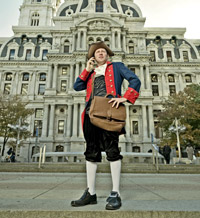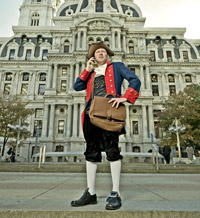- Home
- About
- News
- Tax Reform
- Ethics Reform
- Budget Reform
- Reformer’s Roundtable
- Contact Us







Philadelphia Magazine Tells Of "The Revolutionary"
|
"What kind of man sings "Respect" at City Council hearings, bombards the Mayor's BlackBerry with e-mails, and tries to sell the city's business privilege tax on eBay? Only one who's as deadly serious about reforming Philadelphia as Brett Mandel" The RevolutionaryWhat kind of man sings "Respect" at City Council hearings, bombards the Mayor's BlackBerry with e-mails, and tries to sell the city's business privilege tax on eBay? Only one who's as deadly serious about reforming Philadelphia as Brett Mandel
The last time thongs had a significant impact on politics was the Clinton era, but that’s not stopping Brett Mandel. “I’ve got boxers, too,” he says, rummaging around in a carton and triumphantly producing a pair of briefs that, like the women’s undies he was holding a moment ago, are emblazoned with the logo of his nonprofit, Philadelphia Forward, and the slogan I WON’T HIDE IT, I WANT CHANGE! Custom-printed underwear is not one of the usual accoutrements of activism in Philadelphia, where protestors tend to favor nuts-and-bolts methods like Sharpie-scrawled messages on sandwich boards. But the techniques Brett Mandel uses to champion Philadelphia Forward’s causes — tax and ethics reform, primarily, but also the reform of Philadelphia’s political culture as a whole — are never usual. They’re more akin to contemporary marketing than hippie protests, and they’re turning out to be quite effective attention-getters. Like last year, when he drove around the city on tax day in a van, showing a documentary he’d made of small-business owners decrying the business privilege tax. Or when he made national headlines for listing the BPT on eBay, where he mock-tried to sell it to some other city that might “want to get rid of too many jobs and too many growing businesses.” Or his mass e-mailing to Mayor Street’s BlackBerry. Or the funny stuff on the Philadelphia Forward website: the graphic of the William Penn statue wearing an Abu Ghraib-like hood that accompanied Mandel’s recent screed on ethics, or the ridiculously addictive Tax-Reform Challenge, a game in which players “fight for change” by dropping virtual letters and e-mails on the heads of a virtual John Street (complete with the Mayor’s virtual Hair) and virtual City Council people. “Did you notice that in the game, Council is the correct mix of white women and black women and black men and white men?” Mandel asked me recently at his house near Graduate Hospital. This caused his wife Laura to roll her eyes. “The City Paper called Brett a ‘cool dork,’” she said. “But he’s more of a dork dork.” But like many dorks, Brett Mandel is smart, and everything he does for Philadelphia Forward, even the goofy stuff, is actually very carefully thought out. After all, his stunts aren’t intended just to be funny, to entertain while educating, but to make a serious statement. They’re protests meant to shake up the Establishment and galvanize the citizenry — at best, opening salvos in a battle between the people of Philadelphia and its corrupt-and-contented leaders; and at the very least, speed bumps those leaders will hit as they drive the city to its ultimate destruction. And if this sounds absurd to you — if you think that a bright 37-year-old armed with American Apparel thongs and a MySpace profile that plays the theme from Rocky couldn’t possibly have an effect on policy in a city that hasn’t progressed in 50 years — well, this is the 21st century. BRETT MANDEL WASN’T ALWAYS a radical. Actually, looking at him in a zoning meeting at City Hall, he isn’t one now: His clean-shaven, rosy cheeks and bright tie poking out of a freshly pressed suit contrast with the pointy Marxist beards, messenger bags and dandruff-encrusted shoulders of the other activists in the room. With his chipper attitude and Bartlett’s worth of memorized quotations, he’s a Suit — less someone who rages against the machine and more someone who’s inside the machine. Which he once was, and in many ways still is. A Northeast native whose first job in politics was on the 1991 Rendell for Mayor campaign, Mandel was always interested in the behind-the-scenes parts of government, Philadelphia’s in particular. While in Philly on break from Hamilton College, where he was a public policy major, “I remember looking up at City Hall and thinking, boy, I’d really like to be part of the government that makes decisions,” he says over lunch at Rouge. “Because this is a really great city, and the people making those decisions were making bad decisions.” Nine years later, in 2002, “Bad decisions were still being made,” and Mandel, though he was director of financial and policy analysis in the City Controller’s office, wasn’t in a position to change that. But when then-Controller Jonathan Saidel appointed him to the Tax Reform Commission, charged with crafting recommendations for reducing Philadelphia’s tax rates — some of the highest in the country — Mandel was “thrilled,” he says. “I saw it as a chance to make change. I didn’t need to create gimmicks or scream or have thongs with funny slogans on them. I had to just make policy arguments.” A year and $500,000 later, the commission released its suggestions. Among them were a gradual lowering of the wage tax over 10 years; the implementation of a split tax rate, with a higher tax on land and a lower tax on structures; and a system to gradually eliminate the business privilege tax, the ironically named two-part levy that takes a percentage of business owners’ income and gross receipts regardless of whether they’ve made a profit. Though the commission couldn’t recommend cuts to government programs, it suggested ways the city might make up the revenue, and identified some areas of mismanagement — like the piles of tax checks that go uncashed for months by the revenue bureau, “because literally no one can bother to take them to the bank,” Mandel says now — and put forth other ways in which John Street’s health-obsessed administration might, well, trim the fat. “So we revealed this plan,” says Mandel. “And then the administration basically said, ‘Okay, thanks for giving us this report. We’re not so interested.’” If he sounds bitter, he is. At the moment, anyway. Mandel can go from chipper to bitter and back again in the course of a sentence, or a paragraph, since he tends to speak in paragraphs. “My wife says I’m like a pendulum,” he explains. “I can go from being totally despondent one minute to being totally optimistic the next. I’m a Philadelphia Phillies fan,” he adds. “It’s the same kind of emotional roller coaster.” And back in 2002, the pendulum swung down. It wasn’t just the work of the Tax Reform Commission being brushed aside that bothered Mandel. It was the entire insular, regressive nature of Philadelphia politics. “You have this interconnected cluster of folks, like a web,” he says stabbing at an avocado and crab salad. “And they’ve done deals with each other for decades — ‘I’m on your board, you fund my organization, I vote for you, you contribute to my campaign, I place you here, you support this.’ But once you are inside, your leg’s caught, your arm’s caught, your other leg’s caught. At some level, I don’t think it’s possible for maybe nearly anybody who’s involved right now in the system to make any change, make any good decisions, because this web is so tight.” So when William Miller, a member of the Tax Reform Commission and the CEO of Ross Associates, suggested forming Philadelphia Forward, a nonprofit organization that would advocate the suggestions of the commission and push for reform in other areas, and offered Mandel the position of executive director, he considered it carefully. “At some point, everybody in city government has to ask himself a question,” Mandel says. “Do I get bitter, or do I get jealous? Do I want to become one of those people who are benefiting? Or do I want to fight and overturn the system? Frankly, it’s a lot of work to fight and overturn the system.” “I told him not to quit his day job,” says Mary Tracy, the head of the activist group SCRUB (Society Created to Reduce Urban Blight), who met Mandel at a meeting about the land value tax. “He had a family, and it’s a financial risk. And this line of work is extremely frustrating. It’s Kafka.” But it wasn’t like Mandel would be particularly roughing it. The cause he was fighting for was a popular one (who doesn’t want to pay less in taxes, or for the government to be less corrupt?), supported by the media. And as it happens, the financial situation isn’t perhaps as dire for those pushing for economic gain for businesses as it is for, say, nonprofits that oppose the erection of billboards: To get Philadelphia Forward started, David Thornburgh, then executive director of the Pennsylvania Economy League, donated an office at the Economy League. Miller and Sharmain Matlock-Turner, of the Greater Philadelphia Urban Affairs Coalition, helped raise enough money to pay Mandel the same salary he’d been making: $100K, minus the benefits and the security. As Mandel saw it, he didn’t really have a choice. “It’s like that Platonic quote, ‘The punishment of wise men who refuse to become involved in the affairs of government is to be governed by unwise men,’” he says. “Most of the time, we are governed by unwise men.” THE STORY OF THE TAX Reform Commission — the stomping, essentially, of the idealistic David by the Goliath that is the Philadelphia machine — and the subsequent creation of Philadelphia Forward is one that Brett Mandel, the most buttoned-up radical this city has ever seen, tells (minus the salary details) several times a week. To me; to a dozen people at the Union League; to a group of young professionals gathered after hours at the law firm Morgan Lewis; to a civic association in Mayfair; to a motley crew at Grace Tavern in Grays Ferry; in the conference room at the Pennsylvania Economy League, where he holds a monthly “Reformer’s Roundtable.” It’s closely followed — because when Mandel, an enthusiastic talker, speaks, there is no pausing — by a second tale, a sobering Al Gore-like redux of Philadelphia’s imminent destruction and what we can do to stop it. “This city as a whole is getting older, poorer, stupider, fewer,” he’ll say, over a three-course lunch, over Smartfood and Diet Coke, coffee in Styrofoam cups, pints of beer, bagged lunches. “We’re trading people with means for people with less means, people with education for people with less education, younger people for older people. The needs of our citizenry are growing in a way that threatens to outpace the growth of the city tax base — if it hasn’t already done so. We can’t continue to lose 10,000 people every year. We can’t continue to lose thousands of jobs every year. And why are we losing them? We tax too much, we tax the wrong stuff, and we tax unfairly. “There’s a maxim that says, ‘If you want less of something, tax more of it,’” he’ll say. “Well, we tax wages and businesses, and Philadelphia has lost workers and employers. If we continue like this, the city itself will not be sustainable.” Like the former vice president, he’s managed to whittle down his unsexy subject to something palatable, an impressive feat since most normal Philadelphians honestly don’t like to talk too much about taxes or government inefficiency — can’t, as long as they’re living here. It’s like thinking about where the beef comes from when you’re eating a Big Mac. Why gross yourself out? A baseball aficionado who’s had two nonfiction books on the game published — Minor Players, Major Dreams, for which he joined a minor league baseball team, and Is This Heaven?, about the Field of Dreams movie site in Iowa — Mandel will use sports metaphors to relate to his regular-Joe audience: “Look at it this way,” he’ll say. “Taxes put Philadelphia at an oh-and-two count every single at-bat.” “He talks to you on a human level,” says Fareeda Mabry, who works for the Center For Progressive Leadership and helps Mandel publicize his events. “And he gets people all kinds of hyper.” In the smoky bars and in the grand old rooms, it works. Heads nod, notes get scratched, brochures get pocketed. By the end of his speech, Mandel will add a new batch of names to the list of 25,000 to whom he sends weekly e-mails. A large percentage of them will open up to read galvanizing-yet-goofy sermons like his message of September 26th: THE MAYOR IS ETHICALLY CHALLENGED, on Street’s delay in appointing an ethics board. "Is it possible that the Mayor cannot find five individuals who are to be chosen for their ‘independence, integrity, civic commitment, and high ethical standards’? ... [I]t recalls the story from scripture of Abraham imploring God to spare the wicked cities of Sodom and Gomorrah from destruction since the innocent would be destroyed along with the [wicked]. Abraham asks God to spare the cities if 50 innocents could be found, and God agrees to spare the cities for their sake ... as anyone looking for Philadelphia-to-Sodom direct flight knows, there were not 10 innocents to be found." A percentage of readers will forward the e-mails to their friends, and a smaller percentage will click through to e-mail their Council members. Council gets lots of e-mails from Philadelphia Forward supporters, as well as reams of faxes and, ever since Mandel used his administration contacts to get members’ cell-phone numbers, personal text-messages. Not that Council always cares what constituents have to say: “I get a million of them every day,” sniffs Jannie Blackwell. “I don’t even see them. I have my staff do that.” The members of City Council have mixed feelings about Mandel. They grumble about his blitzkrieg tactics, and occasionally lash out, as when Blackwell scaldingly referred to him as a tool for “special interests” in a Council meeting, according to the Inquirer. But overall, they seem to regard him with affection and even a wary sort of respect. “He’s certainly made himself hard to ignore,” says at-large Councilman Wilson Goode Jr. The Mayor — whose personal BlackBerry received, Mandel estimates, approximately 2,000 e-mails from Philadelphians encouraging him to sign a bill cutting back the business privilege tax after Mandel finagled the address from a City Hall friend — does not think of him so fondly. In case there was any question about that, just recently there was the Bike Ride Incident, already infamous among the chattering political class, in which Mandel bid $400 at a charity auction for a bike ride and some face time with Mayor Street. “The idea of taking the bike ride with the Mayor was not, ‘You know what would be fun? Yelling at the Mayor at the top of my lungs for three hours riding a bike,’” Mandel says. “No. You know what would be fun? To get beyond the rhetoric and have an extended conversation.” What happened instead was that the Mayor scheduled, canceled, rescheduled, canceled, was seen on the morning of one cancellation walking along the Schuylkill, and ultimately backed out altogether, settling up with a check to the charity and ultimately handing Mandel another David and Goliath story, which he promptly typed up, with bitter commentary, and sent out under the headline THE MAYOR IS AS GOOD AS HIS WORD. While this sort of hotheadedness works well with the media, as well as younger people who volley his e-mails around and post about them on their blogs, others believe Mandel’s attacks might work against his cause. “He’s been more caustic than he’s needed to be, and he’s alienated people, in terms of the people he needs to make the changes,” says Uri Monson, a friend of Mandel’s and deputy executive director at the Pennsylvania Intergovernmental Cooperation Authority. And sometimes, his theatrics don’t sit too well with the Honorable folks at City Hall. For instance, when Mandel brought a CD player into the budget hearings and belted out his version of Aretha Franklin’s “Respect.” “I don’t think anyone was impressed,” says Councilman Frank DiCicco. “I think some people didn’t take it seriously. I didn’t think it was the wise thing to do. And I’m known for levity,” he adds. “I’m not some starched-collar guy.” “He had a terrible voice,” says Jannie Blackwell, perhaps again missing the point. “He didn’t sound like Aretha Franklin at all.” STAN SHAPIRO HAS NEVER had to hear Brett Mandel sing, but the very mention of Mandel makes his blood boil: “I have to just compose myself down for a minute,” he says on the phone. Shapiro, a retired lawyer for Community Legal Services, is the founder of One Philadelphia, an advocacy group with a pro-ethics, pro-services, anti-tax-cuts agenda that seems to exist specifically to provide a foil for Philadelphia Forward, and Mandel. “This whole notion that he propounds, that all we have to do is cut 15 percent of the city’s revenue and that’s going to usher in a glorious age — oooh, it just makes me so angry,” says Shapiro. “I’m amazed his ideas have gained so much traction.” Though Mandel’s personality is big, Philadelphia Forward’s tangible victories have been fairly small: In 2004, the administration okayed a minimal but steady cut to the wage tax, and this past spring, Mayor Street signed a bill to reduce the business privilege tax, an unexpected occurrence that Mandel heralded in an e-mail headlined WE WIN MORE TAX REFORM!!!!, the self-congratulating tone of which no doubt sent his opponents into spasms. “Brett Mandel is a smart, ambitious, self-promoting fellow,” says Jonathan Stein, the general counsel for Community Legal Services, tightly. Stein was the lone dissenter on the Tax Reform Commission and is a supporter of One Philadelphia. “At best, this plan he’s pushing is a risky gamble; at worst, it’s a financial and social disaster.” But when asked, Stein and Shapiro and their ilk seem to have a hard time explaining why exactly that is. Why, say, eliminating the business privilege tax — which would seemingly make Philadelphia a more attractive place to do business and would furthermore spread some cash around to people of all income levels, and which Mandel estimates in a year would cost about as much as any civic program, as much as something like Safe Streets, which by the way didn’t work — is such a bad idea, well, they sort of stumble. Where Mandel, as Stein sneers, has “a slick answer for everything,” his opponents tend to bluster that it’s more complicated and nuanced than Philadelphia Forward would have it. They intimate that tax cuts are classist and even somehow racist, and say if anyone should have less of a burden, it ought to be just the lower-income people. Because of the kindness of our hearts? No. Because at least “they spend their money right here,” says Stan Shapiro, unlike the “rich and powerful business owners who take their money out of Philadelphia and buy yachts and go on rich vacations around the world.” Oh. But that’s not all. They also say — and City Hall loves this one, too — that even though Philadelphia’s taxes are higher than any other city taxes in America, we need to keep them that way, because otherwise, the city services would grind to a halt, and there would be no garbage collectors! And, Stein says, people would be “running around with tuberculosis”! But wait, you say — trying to understand how someone like Stein, who is really and truly a good and smart person, can accept this — how come no other city has the business privilege tax, and they get their trash picked up, and no one has tuberculosis? And then he says, but this isn’t another city, this is Philadelphia, which in the past has always been a conversation-stopper: Oh, yeah. This is Philadelphia. After one has been blustered into this insane vortex, Mandel, with his neat tie, accountant’s attention to detail, and easy-to-blush countenance, seems like a relief. His solutions seem simple. Perhaps they are, as some say, too simple, but at least they make sense. Which is why Mandel has become, by default, not only the loudest voice in the room, but the most reasonable one. Even when — perhaps even because — he tells his listeners things they don’t want to hear. “Philadelphia taxes wages and business activity, while most other local jurisdictions tax property,” he says to the young lawyers around the conference table at Morgan Lewis. “If you tax businesses, people can leave. If you tax wages, people can leave. Much of our property is undervalued.” “But if my property tax went up, even if my wage tax went down, I’d lose more money,” says one of the lawyers. Mandel shifts uncomfortably in his chair. “There’s not a nice answer for that,” he says, turning a little pink around the edges. “The answer is, you should have known. You knew when you bought a half-million-dollar house what the tax should have been. It’s about making things fair.” “But people are going to go fucking nuts if you raise their property taxes,” says one of the lawyers. “But maybe it would make them put pressure on City Council to not be corrupt,” Mandel counters. “To provide better services.” “Or maybe it would be easier for them just to take a hike,” the lawyer says. “If I were a politician, I’d so blast you with an old lady who’s been living in her house for 50 years,” says another. By now, Mandel is blushing bright red. “You find exceptions for the people who need them. You make policies. It’s not about nice people losing, and making money. It’s about doing what’s fair.” There’s a pause. “Look, I own a house in Center City,” Mandel adds, emphasizing that he can feel their property tax pain. “I’m certainly not putting money aside and saying, ‘Gee, I’d really like to pay that tax someday.’” Laughs all around. WHETHER OR NOT PHILADELPHIA Forward’s pressure has anything to do with it, taxes have become an important issue in the next mayoral race, and although it’s questionable whether the candidates will do anything about them or merely talk about them, it could be argued that the talking is itself a victory. “We’re the only city, now, with the expectation of a tax reduction built into the budget process, and we’re debating whether it’s ambitious enough,” says Ed Schwartz, the former chairman of the Tax Reform Commission. “And there’d be nobody debating it if it wasn’t for Brett Mandel.” This fact hasn’t necessarily escaped the notice of some more nefarious figures, who might prefer that the conversation didn’t happen at all. “People who have had their names printed in articles that I’ve helped get published, they’ll call me up later and say, yeah, all of a sudden L&I came out. Or, all of a sudden the revenue department, who I haven’t heard from in so many years, has come out and audited such-and-such,” says Mandel. “Are we ever able to say that this happened because of that? No. But — did it?” Soon after he started Philadelphia Forward, Mandel, who plays on a baseball team that practiced at Girard College, got a “friendly phone call.” The caller — he won’t say who — told him “that if I wanted to keep my baseball field, then I might want to not push so hard” — about something, he won’t say what. Soon after, he said, the baseball field became “unavailable.” When pressed, he lets on that the caller might have been someone “associated” with the office of Girard College friend Vince Fumo. And then he clams up. “I don’t want to say ... unfortunately, there is some thuggish behavior in the system. ... Maybe everything that happened was pure coincidence. “I mean, I have a wife and small children,” he adds quietly. That’s the thing about the system in Philadelphia. It’s like a bully, Mandel says, one who’s confident enough in his power that he doesn’t care most of the time if the little guys talk shit. But every once in a while, that bully will smack the little guy down, just to remind him who’s in charge. And then sometimes, like most victims of bullies, the little guys adopt the bullying tactics. At the Tax Reform Meetup at Grace Tavern, when the conversation swung around to the business privilege tax — as it is wont to — Mandel turned to me. “Do you pay the BPT?” he asked. I said I didn’t. “Do you freelance?” I nodded. “Then you’re supposed to be paying it. You’re supposed to pay 6.5 percent,” he said. “So you’re a tax scofflaw. Which means if there’s anything in this story I don’t like, I’ll call my friend over at the bureau.” He looked at me, suddenly serious. “I’m only half kidding.” “MAYBE I HAVE A HAND tied in the web,” Mandel says later, one day in September. “I say I’m outside the system, but then, every other person I know is a part of the system. I can call on people I know in the system. Some of the people who give me money are part of the system, foundations who give me money give to other organizations in the system that have frustrated me, the people who are on my board have relationships — it’s a whole big system.” He sounds depressed. Clearly, the pendulum has swung to the despondent side. Then it swings back. “But I’m a Philadelphia Phillies fan,” he says. “On the one hand, intellectually, I know how difficult it is for them to win. But — I’m a fan. I bleed Phillies red. So no matter how bad it looks, I think: How about if we change this? What if instead of putting Pat Burrell in left field and batting him fifth, we sit him on the bench and put Conine batting fifth, or Dellucci? Maybe that would work. Intellectually, I don’t think a reform slate would work in Philadelphia. But then this morning I had a meeting with someone who will hopefully give money to the organization. I started to feel like if the folks will put pressure on the system, the system will change. My children will be raised in a city with a winning ball team and a growing population. Wouldn’t that be wonderful? What’s that Browning quote — ‘A man’s reach should exceed his grasp, or what’s the heaven for?’” And whether you agree with him about taxes or not, whether you think he’s too chipper, too glib, to be believed, or you suspect he might still be quite entrenched in the web — since, say, when he calls to give you the number for the department of revenue so you can straighten out your imminent tax mess, he adds that he’s been talking with various mayoral candidates about what role he might play in their administrations — you have to admire Brett Mandel for this: He’s hopeful. He doesn’t consider “This is Philadelphia” to be the end of the conversation, but the beginning. Which, when you think about it, might be the biggest and most impressive change anyone’s made in Philadelphia in a long time. Back at Morgan Lewis, Mandel finishes up his speech. “Sign up for my e-mails,” he says. “Write to your elected officials. Knock on the Mayor’s door, and leave some dog poop burning. Your voice is important.” And, possibly for the first time in Philadelphia, everyone in the room leaves feeling as though that might actually be true. Originally published in Philadelphia Magazine, December 2006. |

 The December 2006 issue of Philadelphia Magazine features a package billed "THROW 'EM OUT! PHILLY'S POLITICAL REVOLUTION STARTS NOW," which includes a portrait of the local reform movement and a feature on Philadelphia Forward Executive Director Brett Mandel.
The December 2006 issue of Philadelphia Magazine features a package billed "THROW 'EM OUT! PHILLY'S POLITICAL REVOLUTION STARTS NOW," which includes a portrait of the local reform movement and a feature on Philadelphia Forward Executive Director Brett Mandel. 